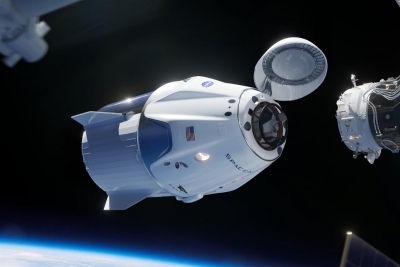The Prospero satellite, also known as the X-3, was launched by the United Kingdom in 1971. It was designed to undertake a series of experiments to study the effects of the space environment on communications satellites and remained operational until 1973, after which it was contacted annually for over 25 years. Although Prospero was the first British satellite to have been launched successfully by a British rocket, Black Arrow; the first British satellite placed in orbit was Ariel 1, launched in April 1962 on a US rocket.
In the context of spaceflight, a satellite is an object that has been intentionally placed into orbit. These objects are called artificial satellites to distinguish them from natural satellites such as Earth's Moon.
On 4 October 1957, the Soviet Union launched the world's first artificial satellite, Sputnik 1. Since then, about 8,900 satellites from more than 40 countries have been launched. According to a 2018 estimate, about 5,000 remained in orbit. Of those, about 1,900 were operational, while the rest had exceeded their useful lives and become space debris. Approximately 63% of operational satellites are in low Earth orbit, 6% are in medium-Earth orbit (at 20,000 km), 29% are in geostationary orbit (at 36,000 km) and the remaining 2% are in various elliptical orbits. In terms of countries with the most satellites, the United States has the most with 2,944 satellites, China is second with 499, and Russia third with 169.
A few large space stations, including the International Space Station, have been launched in parts and assembled in orbit. Over a dozen space probes have been placed into orbit around other bodies and become artificial satellites of the Moon, Mercury, Venus, Mars, Jupiter, Saturn, a few asteroids, a comet and the Sun.
Satellites are used for many purposes. Among several other applications, they can be used to make star maps and maps of planetary surfaces, and also take pictures of planets they are launched into. Common types include military and civilian Earth observation satellites, communications satellites, navigation satellites, weather satellites, and space telescopes. Space stations and human spacecraft in orbit are also satellites.
Satellites can operate by themselves or as part of a larger system, a satellite formation or satellite constellation.
Satellite orbits have a large range depending on the purpose of the satellite, and are classified in a number of ways. Well-known (overlapping) classes include low Earth orbit, polar orbit, and geostationary orbit.
A launch vehicle is a rocket that places a satellite into orbit. Usually, it lifts off from a launch pad on land. Some are launched at sea from a submarine or a mobile maritime platform, or aboard a plane (see air launch to orbit).
Satellites are usually semi-independent computer-controlled systems. Satellite subsystems attend many tasks, such as power generation, thermal control, telemetry, attitude control, scientific instrumentation, communication, etc.

1971Oct, 28
Britain launches the satellite Prospero into low Earth orbit atop a Black Arrow carrier rocket from Launch Area 5B at Woomera, South Australia, the only British satellite to date launched by a British rocket.
Choose Another Date
Events on 1971
- 8Jan
Zulfikar Ali Bhutto
Bowing to international pressure, President of Pakistan Zulfikar Ali Bhutto releases Bengali leader Sheikh Mujibur Rahman from prison, who had been arrested after declaring the independence of Bangladesh. - 7Jun
First Amendment to the United States Constitution
The United States Supreme Court overturns the conviction of Paul Cohen for disturbing the peace, setting the precedent that vulgar writing is protected under the First Amendment to the United States Constitution. - 11Jul
Chile
Copper mines in Chile are nationalized. - 21Sep
Bhutan
Bahrain, Bhutan and Qatar join the United Nations. - 24Nov
D. B. Cooper
During a severe thunderstorm over Washington state, a hijacker calling himself Dan Cooper (aka D. B. Cooper) parachutes from a Northwest Orient Airlines plane with $200,000 in ransom money. He has never been found.

 English
English  español
español  français
français  português
português  русский
русский  العربية
العربية  简体中文
简体中文 